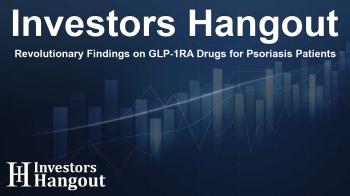Revolutionary Findings on GLP-1RA Drugs for Psoriasis Patients

Understanding GLP-1RAs and Their Impact on Psoriasis
Recent studies have unlocked a treasure trove of information regarding the relationship between glucagon-like peptide-1 receptor agonists (GLP-1RAs) and their effects on psoriasis patients. Research presented at the prestigious European Academy of Dermatology and Venereology (EADV) Congress 2025 illuminates the ways these medications dramatically reduce death and cardiovascular risks in individuals battling this chronic skin condition.
Key Findings: Risk Reduction and Benefits
It’s been unveiled that psoriasis patients utilizing GLP-1RAs encounter a staggering 78% lower risk of mortality and a 44% reduction in the likelihood of major cardiovascular incidents. These impressive statistics starkly contrast with those taking alternative diabetes or weight-loss medications, spotlighting the potential of these agents as not merely therapeutic measures for weight or glucose control but as pivotal components in enhancing overall health in psoriasis sufferers.
Substance Use Reduction
The same groundbreaking study, heralded as the most extensive of its kind, discovered significant reductions in substance use issues—specifically, a 65% reduction in alcohol abuse and nearly 50% in general substance abuse. This offers a glimmer of hope for patients battling not just the physical symptoms of psoriasis but also the psychological intricacies often intertwined with the condition.
Psoriasis: A Deeper Look
For context, psoriasis is more than just a skin ailment; it impacts an estimated 2-3% of the population and is closely linked to heightened risks of serious health complications such as heart attacks, strokes, and even mental health disorders like depression and anxiety. The emergence of new research surrounding GLP-1RAs positions them as a multifaceted treatment option that could address both physical health and quality of life concerns.
Methodology of the Study
The research harnessed an extensive database of over 110 million patients, providing a robust framework for the comparison of over 6,000 psoriasis patients with diabetes or obesity over a two-year timeframe. The analysis included 3,048 individuals treated with GLP-1RAs, juxtaposed against a similar cohort receiving other anti-diabetic or anti-obesity medications. This comprehensive approach ensured that all potential confounding factors, like age and sex, were accounted for.
In-Depth Insights from the Research Team
Professor Ralf Ludwig, the lead author behind this groundbreaking analysis, expressed excitement about the implications of these findings. He stated that GLP-1 receptor agonists extend their benefits beyond managing weight and blood sugar levels. The study suggests these drugs may also significantly affect cardiovascular health and mental well-being in individuals diagnosed with psoriasis. This could be due to the ability of GLP-1 receptor activation to inhibit proinflammatory mediators, which are often elevated in psoriasis patients.
Safety and Efficacy
Notably, the safety outcomes observed were in line with those seen in the general population. Patients reported no substantial increase in adverse effects, including issues like hypoglycemia, nausea, or constipation. This safety profile suggests that GLP-1RAs could emerge as a preferred therapeutic avenue for psoriasis patients concurrently dealing with diabetes or those seeking weight management strategies.
Future Implications for Treatment Strategies
The potential for GLP-1RAs to reshape treatment paradigms for psoriasis presents an exciting frontier. As healthcare continues to evolve, the integration of such research findings can drive better patient outcomes, offering new avenues for managing this complex condition. By focusing on both the physical and psychological aspects of psoriasis, treatments can be tailored to provide comprehensive care for individuals affected by this illness.
Frequently Asked Questions
What are GLP-1RAs?
GLP-1 receptor agonists are medications commonly used to treat type 2 diabetes and obesity, known for their ability to control blood sugar and aid in weight loss.
How do GLP-1RAs benefit psoriasis patients?
The recent research indicates that GLP-1RAs may significantly lower the risk of death and major cardiovascular events for psoriasis patients, while also reducing alcohol and substance abuse.
Is psoriasis linked to cardiovascular issues?
Yes, psoriasis is associated with a higher likelihood of cardiovascular events, stroke, and other serious health complications.
What do recent studies say about the safety of GLP-1RAs?
Recent findings show that GLP-1RAs have a favorable safety profile, with no significant increase in adverse effects compared to the general population.
Will GLP-1RAs become the primary treatment for psoriasis?
While they show great promise, further research is needed to fully understand the long-term implications before they can be deemed the primary treatment option for psoriasis.
About The Author
Contact Olivia Taylor privately here. Or send an email with ATTN: Olivia Taylor as the subject to contact@investorshangout.com.
About Investors Hangout
Investors Hangout is a leading online stock forum for financial discussion and learning, offering a wide range of free tools and resources. It draws in traders of all levels, who exchange market knowledge, investigate trading tactics, and keep an eye on industry developments in real time. Featuring financial articles, stock message boards, quotes, charts, company profiles, and live news updates. Through cooperative learning and a wealth of informational resources, it helps users from novices creating their first portfolios to experts honing their techniques. Join Investors Hangout today: https://investorshangout.com/
The content of this article is based on factual, publicly available information and does not represent legal, financial, or investment advice. Investors Hangout does not offer financial advice, and the author is not a licensed financial advisor. Consult a qualified advisor before making any financial or investment decisions based on this article. This article should not be considered advice to purchase, sell, or hold any securities or other investments. If any of the material provided here is inaccurate, please contact us for corrections.

